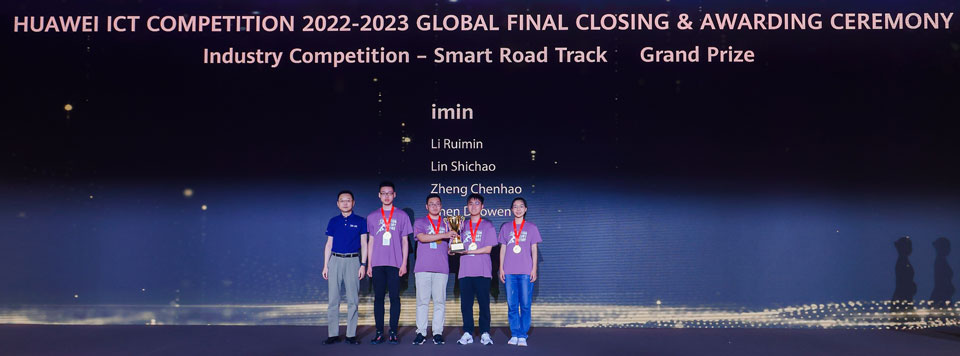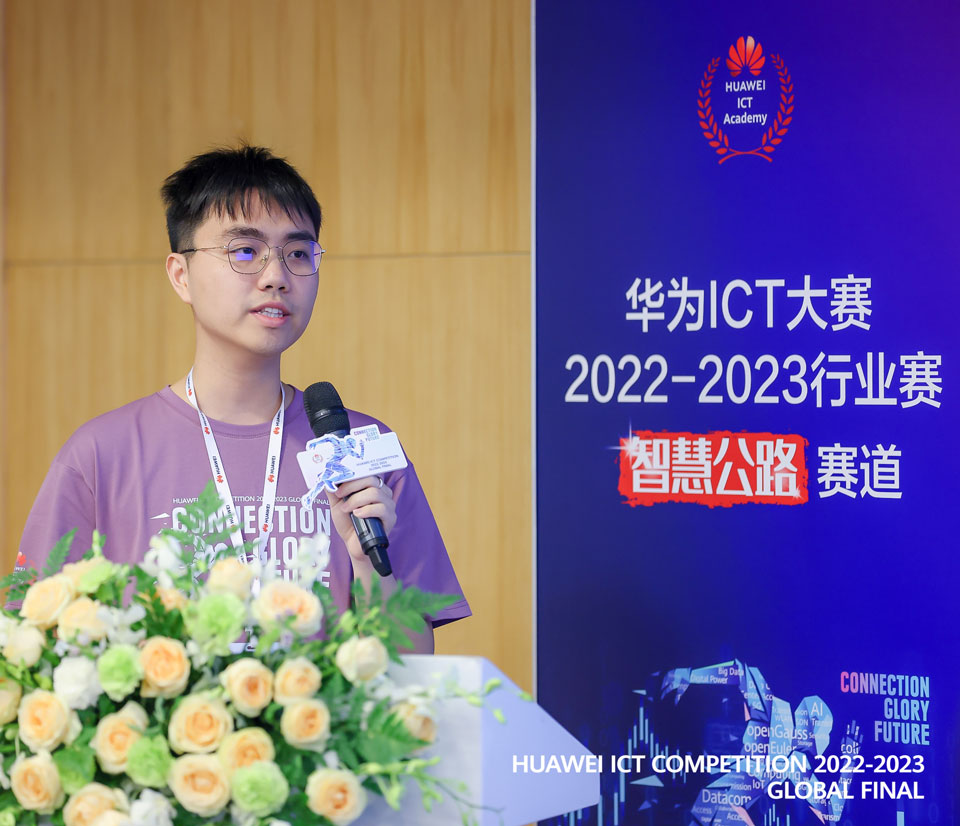Industry Ecosystem
Brightening Digital China's Way with Smart Transportation
The 7th Huawei ICT Competition included the smart road track, enabling students to demonstrate the vast possibilities of smart transportation.


By Lin Shichao, Tsinghua University

Figure 1 Tsinghua University's imin team won the Smart Road Track Grand Prize in the Huawei ICT Competition 2022-2023 Global Final.

In May 2023, my friends, Zheng Chenhao and Chen Duowen, and I went on stage to receive the grand prize of the 7th Huawei ICT Competition (Figure 1). We had received other awards before, but this time was different — there were colorful flags from all over the world, contestants were cheering, and I was blown away by the electric atmosphere. Winning the grand prize has filled me with pride and a new found confidence in my studies.
Know about the competition
I have seen Huawei ICT Competition listed amongst national college student competitions released by the Chinese Association of Higher Education. Huawei ICT Competition is an international event that serves as a platform for students to showcase their talents, exchange ideas, and make new friends. However, thinking back to the real reason I decided to sign up, I saw it in a promotional article I came across by chance in November last year, and the advert got me interested in the format of the competition. One of the topics of the smart road track — "congestion management detection, optimized management, and simulation research based on vehicle trajectory big data" — also caught my eye as it is strongly related to my own research topic of urban traffic signal management. It was then that I ran the idea past Zheng Chenhao and Chen Duowen, and we shared our hopes of signing up for the competition in our subject group. The idea received strong support from our instructor, Professor Li Ruimin, and thus our team was formed.
After signing up for the competition, we were so impressed to see that Huawei had provided each team with the holographic data of an intersection. The data included map and vehicle data like vehicle identities, attributes, speed, spatial and temporal locations, and driving status. This was all generated by Huawei using radar, video, high-precision maps, edge computing, and other cutting-edge technologies, which was game-changing for us. In our usual research, we would rarely come into contact with real data. It enabled us to have a better understanding of actual engineering problems and city management, which helped us propose more feasible, practical, and economical technical solutions to truly improve infrastructure construction and the travel experience of urban residents.
Create solutions and pursue excellence
During the preparation process, we had endless discussions and conducted reams and reams of analysis. We tried and tested all kinds of methods and solutions.
Our topic was, "how to solve vehicle queuing and congestion during peak hours for more accurate, smarter, and more practical traffic sensing and management."
Under the guidance of Professor Li Ruimin, we found a method for extracting trajectory data based on key location points and identified the key requirements of intersections. We analyzed features of road traffic flow, proposed a distributed control method supported by real-time detection data, and built a practical algorithm implementation framework. Based on simulation experiments, we analyzed the performance of the algorithm and verified the adaptability and effectiveness of the method in vehicle congestion management.

Figure 2 Industry Competition-Smart Road Track of Huawei ICT Competition 2022-2023 Global Final
To come out on top in the competition, it is not enough to just offer workable solutions; we also needed to present our entry and articulate its value to win the recognition of judges. Seneca once said that, "Luck is what happens when preparation meets opportunity," and that is absolutely true. We practiced and practiced. Before our official oral defense was due, we went to Huawei campus to find out about the competition environment in advance, and relieve some of the tension we had built up. On the big day, we successfully presented our solution and managed to give impressive responses to the judges' questions (Figure 2).
The award ceremony was held on May 27. We were nervous but excited as we waited for the winners to be announced. When I heard the name of our team, my eyes welled with tears, and the cheers of the crowd rang in my ears. All of our hard work over the past six months had paid off, and in that moment, everything was worth it.
Strive for a bright future
Through the competition, we were able to compete with global participants, make new friends, and learn about the latest technologies and industry trends. It not only developed our professional skills and problem-solving capabilities, but also provided inspiration for our future career development. I will definitely recommend the Huawei ICT Competition to my peers.
According to China's 14th Five-Year Plan for Digital Transportation, by 2025, transportation facilities will be digitally sensed, information networks will have a wider coverage, transportation services will be more convenient and intelligent, and industry governance will be digital, collaborative, and integrated with applications that have a robust network security.
As a student of Tsinghua University, I always keep in mind the school motto of Self-discipline and Social Commitment. The purpose of learning and delving into technology is not only for my own future, but also for the needs of national development. As a member of the transportation research team, I also hope to make contributions to smart transportation. In the future, my teammates and I will build on the research results of this competition and continue to improve our solutions by adding richer data and engineering scenarios to create a safer, more efficient, and sustainable urban transportation system for China.
- Tags:
- Digital Transformation





